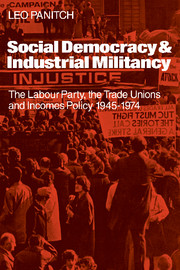 Social Democracy and Industrial Militiancy
Social Democracy and Industrial Militiancy Book contents
- Frontmatter
- Contents
- Preface
- List of Abbreviations
- Introduction
- 1 The 1945 Labour Government: the mixed economy and wage restraint
- 2 Incomes policy and Labour in opposition
- 3 The voluntary incomes policy agreement
- 4 The devaluation of voluntarism
- 5 The politics of wage freeze
- 6 The statutory incomes policy – Labour Government versus labour movement
- 7 ‘In place of strife’
- 8 Industrial militancy and political stagnation
- Conclusion
- Appendixes
- Notes
- Index
4 - The devaluation of voluntarism
Published online by Cambridge University Press: 07 October 2011
- Frontmatter
- Contents
- Preface
- List of Abbreviations
- Introduction
- 1 The 1945 Labour Government: the mixed economy and wage restraint
- 2 Incomes policy and Labour in opposition
- 3 The voluntary incomes policy agreement
- 4 The devaluation of voluntarism
- 5 The politics of wage freeze
- 6 The statutory incomes policy – Labour Government versus labour movement
- 7 ‘In place of strife’
- 8 Industrial militancy and political stagnation
- Conclusion
- Appendixes
- Notes
- Index
Summary
The move towards statutory powers
The voluntary incomes policy was marked, from the beginning, by an inherent instability. The Retail Price Index in mid-April 1965 had shown a rise of four points since the election, the largest rise for a half-year since 1952. Moreover, the Chancellor's April budget substantially increased indirect taxation which gave a further impetus to price increases. Insofar as Brown was correct in his expectation that price stability could create ‘the only climate in which we can hope to get an incomes policy’ the policy was beginning to operate in inauspicious circumstances. An additional justification for wage claims above the norm lay in the fact that dividend payments, the fastest growing sector of incomes since the war, had increased in the first quarter of 1965 by 28% above the previous year as companies anticipated the effects of the new corporation and capital gains taxes. Finally, apart from the effects of these developments on newly-framed wage claims, there were before April 1965 wage commitments and settlements for some 10 million workers which had not been governed by the norm; these forward commitments accounted for about half of the total increase in hourly wage rates in 1965. In these circumstances, many of the policy's trade union adherents submitted claims for increases above the norm. Indeed, the NUR's President, S. J. Greene, later told the Donovan Commission that the trade union movement had never accepted the 3½% norm.
- Type
- Chapter
- Information
- Social Democracy and Industrial MilitiancyThe Labour Party, the Trade Unions and Incomes Policy, 1945–1947, pp. 85 - 105Publisher: Cambridge University PressPrint publication year: 1976


